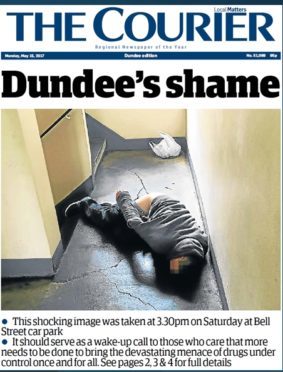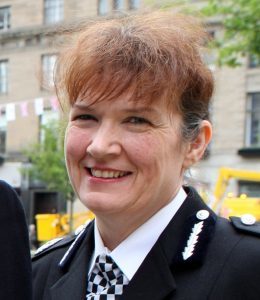Heroin use in Dundee could reach levels not seen since the epidemic of the 1980s unless city leaders show the courage necessary to tackle the scourge, a former top policewoman has said.
Angela Wilson, the former assistant chief constable of Tayside Police, was speaking after The Courier published the shocking image of an unconscious half-naked drug addict lying in the stairwell of Bell Street car park on Saturday afternoon.
The bloody syringe used by the addict lay just inches from his body, which had been discovered by one of our reporters who was on a day out with his wife and one-year-old son. The man had pulled down his jeans and underpants in order to inject the drug.
During her time at the force, Ms Wilson played a key role in reducing the flow of heroin into Dundee.
But while police have had success in targeting some of the “Mr Bigs” behind the drugs trade, she believes helping addicts requires a different approach.
Ms Wilson said: “As a society we really must look to find long-term solutions to these ‘wicked issues’ that blight people’s lives.
“Politicians, police, health services and social services must come together and demonstrate courageous leadership and stop brushing these issues under the carpet – do they want a return to the dreadful heroin problems in Dundee of the 1980s?
“There are solutions out there. It just takes courage and integrity to implement them.”
Ms Wilson said safe spaces for addicts to take heroin, such as those planned for Glasgow, could help but added: “Shooting galleries is a totally inappropriate term and evokes negativity and hostility.
“It is a safe place to attend to take heroin with medical care available.”
Leading drugs charities have also backed the call for their introduction.
Andrew Horne, director of Addaction Scotland, said: “We know there’s a core of people who inject drugs in Dundee and it’s challenging to reach them and help them into treatment and recovery.
“Research shows that supervised injecting rooms are already well-established across Europe – and the bid for these facilities in the Republic of Ireland made legal progression this month.
“We’ve voiced Addaction’s support for such facilities in Glasgow. They have the primary aim of reducing both public consumption, discarded equipment and drug-related deaths, but there are other crucial spin-off objectives.
“In particular, people would get access to a range of other services like health check-ups, social work support and access to treatment and recovery.
“It’s impossible to help people make changes in their lives if they are not in touch with local services; which is something supervised injection facilities could be the gateway to.”
Mr Horne added: “If an individual is found unconscious, dial 999 no matter what the cause. Health staff can refer people to services like Addaction on discharge from hospital and we will do our utmost to support them.”
A Scottish Government spokeswoman said: “Our latest figures show that drug taking among adults is falling, and that levels of drug use among young people remains low.
“We have invested over £630 million to tackle problem drug and alcohol use since 2008 and have a national drugs strategy to make sure recovery is a reality for individuals, families and communities.
“We have no plans to introduce drug consumption rooms or heroin assisted treatment on a national basis.
“We constantly look at new developments in drugs policy to see how effective they are, and we would encourage an independent evaluation of any such facility.”

